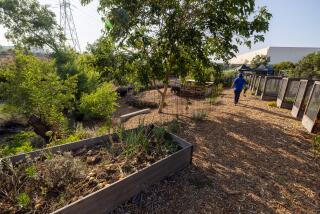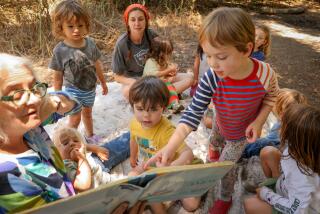Does creationism have a place at a public school?
Los Angeles Unified School District biology teacher Tom Phillips is retiring this month, but on his way out, he’s decided to go public with a pet peeve. Phillips believes the continued Christian fundamentalist effort to debunk evolution is undermining science education in the United States, and he has seen evidence of that with his own students at Harbor Teacher Preparation Academy in Wilmington.
“Large numbers of Christian Evangelicals have flocked to this school because of its strong academics and have turned it into a publicly supported religious institution,” Phillips, 64, said in an email that began several weeks of correspondence between us.
The evolution vs. creationism debate has a long history, dating back to the 1925 Scopes monkey trial in Tennessee. In 1987, the U.S. Supreme Court struck down a Louisiana law that barred the teaching of evolution unless creationism was also part of the curriculum. But some states, at the urging of Christian conservatives, still encourage teachers to challenge evolution as part of teaching “critical thinking.”
I’m willing to go out on a limb and suggest there’s not going to be a “challenge evolution” movement any time soon in California. But Phillips believes some activities of the student-led Christian Club on his high school campus come close to violating the separation of church and state. A local clergyman often attends club meetings, Phillips said, and twice in the last few years, the club has heard presentations from Bill Morgan, a creationist of national prominence.
“He mixes with students saying, ‘Hi, I’m Bill Morgan. Do you think we descended from monkeys? Well, what do you think of this?’ It was in the form of proselytizing,” said Phillips.
He added that Morgan can be a persuasive debater, making students all the more vulnerable to indoctrination. Phillips said Morgan, an engineer whose beliefs and taped debates can be found at www.fishdontwalk.com, conducts his presentation as if he were a teacher.
“He says something and says, ‘Now class, how did that go again?’ ”
Mattie Adams, the school principal, suggests Phillips is greatly over-stating matters, given how rarely the Christian Club has invited a creationist to school. She told me she passed along Phillips’ complaints, and district officials determined that the club — which meets during lunch—has been operating within district guidelines, including those regarding guest speakers. A district representative pointed me to a policy statement that says “voluntary student initiated meetings are permitted, regardless of religious, political or other content.”
I wasn’t allowed to talk to students because they didn’t have parental approval, but I was told that Christian Club members rarely discuss creationism, its variant, intelligent design, or other controversial topics. History teacher Brian Groven, the club sponsor, says the students generate the topics on their own, and they’re more inclined to discuss generic teenage issues. Last week’s subject had to do with the meaning of Christmas.
Even Phillips — who considers himself a conservative and was a career Air Force pilot and Vietnam vet before taking up teaching — said he believes there’s a laudable “good citizenship” component to the club. But whether the students are being influenced at home, in church or through Christian Club connections, Phillips finds it disturbing to see them turn in class reports in which they question irrefutable evidence that Darwin had it right.
On Tuesday, I was in Phillips’ classroom during his lunch break when Adams walked in, and a spirited discussion began.
“We’re allowing students to exercise their rights on campus,” said Adams, who later told me she challenged evolution as a young student and still believes “it’s good for students to look at different versions of how man came to be.”
“I believe they have a right” to exist, Phillips said. “But … when students are taught that science is a bunch of malarkey, and when people are trying to indoctrinate them with something that’s not true,” it’s a disservice to students and a hindrance to science teachers.
Adams said there’s a gay-lesbian club on campus, and she supports that, too.
Sure, I said, but is that a fair comparison? Mr. Phillips sponsors the school’s military club, I said. If he invited speakers who contradicted historical fact by insisting the Holocaust didn’t happen, would that be appropriate?
LAUSD policy says that “non-school persons may not conduct, control or regularly attend meetings.” Ralph Girodano, youth pastor at Wilmington’s Harbor Christian Center, told me he attends fewer than half the high school Christian Club’s weekly meetings, so I’ll let readers be the judge of whether he’s in compliance.
Harbor Christian is an Assemblies of God church, with a website that proclaims: “We believe that Hell is real.... We believe that the power and gifts of the Holy Spirit … include divine healing, the gift of tongues, miracles, and signs & wonders.”
Giordano told me he believes all those things, but doesn’t preach them at Harbor Prep.
“It’s a Christian club, so the Bible is the source of a lot of the discussion,” said Giordano, who told me he believes in creationism and can’t understand why Phillips or anyone else would be intolerant of a student’s healthy inclination to challenge what’s being taught.
But it isn’t a healthy inclination at all, says Francisco J. Ayala, a UC Irvine biology professor who laments the creeping influence of creationists, with polls now indicating that nearly half of U.S. residents believe God created humans in their present form. Ayala, a decorated scholar, is a former Dominican priest who believes the natural process of evolution is not incompatible with a belief in a God who created the world.
But teaching intelligent design while denying the overwhelming evidence of evolution, Ayala said, is like teaching “alchemy rather than chemistry, astrology in contrast to astronomy, or witchcraft as an alternative to medicine.”
Ayala also believes “the teaching of intelligent design is contrary to Christian doctrine.”
“If we believe in God as the omnipotent and benevolent creator,” said Ayala, “and that God designed human beings, he would have a lot to answer for.”
More to Read
Sign up for Essential California
The most important California stories and recommendations in your inbox every morning.
You may occasionally receive promotional content from the Los Angeles Times.











